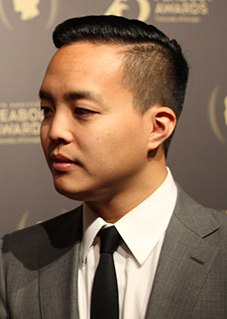A Quote by John Lasseter
You have to do three things really well to make a successful film. You have to tell a compelling story that has a story that is unpredictable, that keeps people on the edge of their seat where they can't wait to see what happens next. You then populate that story with really memorable and appealing characters. And then, you put that story and those characters in a believable world, not realistic but believable for the story that you're telling.
Related Quotes
Every movie has three things you have to do - you have to have a compelling story that keeps people on the edge of their seats; you have to populate that story with memorable and appealing characters; and you have to put that story and those characters in a believable world. Those three things are so vitally important.
I think that when I'm telling a story, I'm doing the best I can to tell the story as fully as I can, and if there are various fractures that happen in the story, then that's just the very thing that the story is as opposed to my looking for avenues of difference in one story. They just really do exist. For me, anyway.
Kids, if anything, are harder to write for because they are a more discerning audience. They will not stay with you if you go off on a tangent or if you give them extraneous information that doesn't serve the story. You really have to tell a tight story. You have to give them humor and suspense and believable characters. All those things that adults want too, but you have to be really on your game when you're writing for kids.
I think up to this point, it's been difficult to suggest a world where Batman and Superman and Wonder Woman and others could exist in the same universe. That was one of the things I really wanted to try and get at. Not to mention, the amazing opportunity to bring those characters and have those characters tell an important story, their own story, within the confines of a film.
I think that people have to have a story. When you tell a story, most people are not good storytellers because they think it's about them. You have to make your story, whatever story it is you're telling, their story. So you have to get good at telling a story so they can identify themselves in your story.
Animation story boarding works differently than live action story boarding. The story crew along with a writer really does shape and create the film - the world and it's characters. We meet almost every day and brainstorm the plot of the film. It's a highly collaborative process - and we continue to improve the story until we literally run out of time.
Each story presents a mystery that has to be solved in the process of writing. When I'm at work on a story, I'm completely immersed in that world and in the lives of those characters; they're utterly real to me. Then, when I've completed the story, it all just falls away. The whole compulsion to understand is over.
I know a good story from a bad story. But when you have a really good story and they make it bad, I'll say to my wife, "Oh, tonight, I'm going to enjoy watching television because I did great, and wait until you see this." And then, they put it on and it's like - oh, that's not so good. They are fake news.
The Universe story is the quintessence of reality. We perceive the story. We put it in our language, the birds put it in theirs, and the trees put it in theirs. We can read the story of the Universe in the trees. Everything tells the story of the Universe. The winds tell the story, literally, not just imaginatively. The story has its imprint everywhere, and that is why it is so important to know the story. If you do not know the story, in a sense you do not know yourself; you do not know anything.
The ‘experimental’ writer, then, is simply following the story’s commands to the best of his human ability. The writer is not the story, the story is the story. See? Sometimes this is very hard to accept and sometimes too easy. On the one hand, there’s the writer who can’t face his fate: that the telling of a story has nothing at all to do with him; on the other hand, there’s the one who faces it too well: that the telling of the story has nothing at all to do with him
What's your story? It's all in the telling. Stories are compasses and architecture; we navigate by them, and to be without a story is to be lost in the vastness of world that spreads in all directions like arctic tundra or sea ice. To love someone is to put yourself in their place, we say, which is to put yourself in their story, or figure out how to tell yourself their story. Which means that a place is a story, and stories are geography, and empathy is first of all an act of imagination, a storyteller's art, and then a way of traveling from here to there.





































